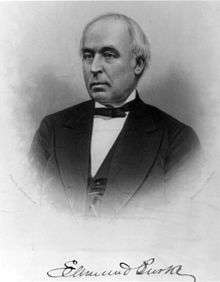Edmund Burke (congressman)
| Edmund Burke | |
|---|---|
 | |
| United States Commissioner of Patents | |
|
In office May 5, 1846 – September 3, 1850 | |
| Appointed by | James Polk |
| Preceded by | Henry Leavitt Ellsworth |
| Succeeded by | Thomas Ewbank |
| Member of the U.S. House of Representatives from New Hampshire's At-large district | |
|
In office March 4, 1839 – March 3, 1845 | |
| Preceded by | James Farrington |
| Succeeded by | Mace Moulton |
| Personal details | |
| Born |
January 23, 1809 Westminster, Vermont |
| Died |
January 25, 1882 (aged 73) Newport, New Hampshire, U.S. |
| Citizenship | US |
| Political party | Democratic Party |
| Spouse(s) |
Ann Matson Burke Mary E Whitney Burke |
| Children | Frances Matson Burke Dana |
| Profession |
Lawyer Newspaper editor Politician |
| Military service | |
| Allegiance |
|
| Service/branch | New Hampshire Militia |
| Rank |
Adjutant Brigade inspector |
Edmund Burke (January 23, 1809 – January 25, 1882) was an American lawyer, newspaper editor and politician. He served as the United States Commissioner of Patents and as a U.S. Representative from New Hampshire in the 1800s.
Early life and career
Born in Westminster, Vermont,[1] Burke was the son of Elijah and Grace (Jeffers) Burke.[2] He attended the public schools and studied law with Henry Adams Bellows, future Chief Justice of the New Hampshire Supreme Court.[3] Burke was admitted to the bar in 1826. He began practicing law in Colebrook, New Hampshire before moving to Claremont, New Hampshire in 1833.
He assumed editorial management of the New Hampshire Argus, and when he moved to Newport, New Hampshire in 1834, he united the Argus with the New Hampshire Spectator of Newport.[4] The newly created Argus and Spectator was a political newspaper.[5] He was commissioned as an adjutant in the New Hampshire State militia in 1837 and as brigade inspector in 1838.[6]
Political career
Elected as a Democrat to the Twenty-sixth, Twenty-seventh and Twenty-eighth Congresses, Burke served as United States Representative for the state of New Hampshire from March 4, 1839 to March 3, 1845. He was not a candidate for renomination in 1844.[7]
He was appointed Commissioner of Patents by President Polk and served from May 5, 1846 to September 3, 1850.[8][9] While serving in that office, he wrote a series of articles about the tariff under the signature Bundelcund. The articles were written for The Washington Union and circulated as a pamphlet.[10]
After leaving the patent office, he resumed the practice of law in Newport, New Hampshire. He served as delegate to the Democratic National Conventions in 1844 and 1852.[11] In 1867, he served as delegate to the Democratic State convention and served as presiding officer. He was a member of the State board of agriculture in 1871, and was a member of the Vermont Historical Society.[12]
Death
Burke died in Newport, Sullivan County, New Hampshire on January 25, 1882 (age 73 years, 2 days). He is interred at Maple Grove Cemetery in Newport, New Hampshire.[13]
Personal life
Burke married Ann Matson on December 1, 1840. His wife was the granddaughter of Aaron Matson, US Representative from New Hampshire. They had one daughter, Frances Matson Burke. Ann died at the age of twenty-eight.[14] Burke later married Mary Elizabeth Whitney.
References
- ↑ "Publications - Portraits of State and National Legislators and Others On the First Floor of The State House". New Hampshire Division of Historical Resources. Retrieved January 1, 2014.
- ↑ Bell, Charles Henry (1893). The bench and bar of New Hampshire: including biographical notices of deceased judges of the highest court, and lawyers of the province and state, and a list of names of those now living. Houghton, Mifflin and company. p. 222.
- ↑ Metcalf, Henry Harrison and McClintock, John Norris (1880). The Granite Monthly: A New Hampshire Magazine Devoted to History, Biography, Literature, and State Progress, Volume 3. H.H. Metcalf,. p. 204.
- ↑ The Society (1841). The American Quarterly Register, Volume 13. The Society. p. 178.
- ↑ Bell, Charles Henry (1893). The bench and bar of New Hampshire: including biographical notices of deceased judges of the highest court, and lawyers of the province and state, and a list of names of those now living. Houghton, Mifflin and company. p. 222.
- ↑ Gale Cengage Learning. The military history of the state of New-Hampshire. Gale Cengage Learning. p. 307.
- ↑ "Edmund Burke". Biographical Directory of the United States Congress. Retrieved 4 January 2014.
- ↑ Polk, James Knox (1996). Correspondence of James K. Polk: January-June 1845. Univ. of Tennessee Pres. p. 283.
- ↑ "1 J. Pat. Off. Soc'y 584 (1918-1919) Edmund Burke, Commissioner of Patents 1845 to 1849; Brumbaugh, N. J.". HEINONLINE. Retrieved January 1, 2014.
- ↑ Burke, Edmund. protective system considered connection present tariff series twelve essays originally published washington union over signature bundelcund. Abe Books.
- ↑ Democratic National Convention (1852). Official Report of the Proceedings. Democratic National Convention. p. 14.
- ↑ Edmund Burke. Proceedings of the Vermont Historical Society. Retrieved 4 January 2014.
- ↑ Spencer, Thomas E. (1998). Where They're Buried: A Directory Containing More Than Twenty Thousand Names of Notable Persons Buried in American Cemeteries, with Listings of Many Prominent People who Were Cremated. Genealogical Publishing Com,. p. 221.
- ↑ Metcalf, Henry Harrison and McClintock, John Norris (1880). The Granite Monthly: A New Hampshire Magazine Devoted to History, Biography, Literature, and State Progress, Volume 3. H.H. Metcalf,. p. 204.
External links
| Wikimedia Commons has media related to Edmund Burke (congressman). |
| United States House of Representatives | ||
|---|---|---|
| Preceded by Samuel Cushman |
Representative of New Hampshire 1839-1845 |
Succeeded by Mace Moulton |